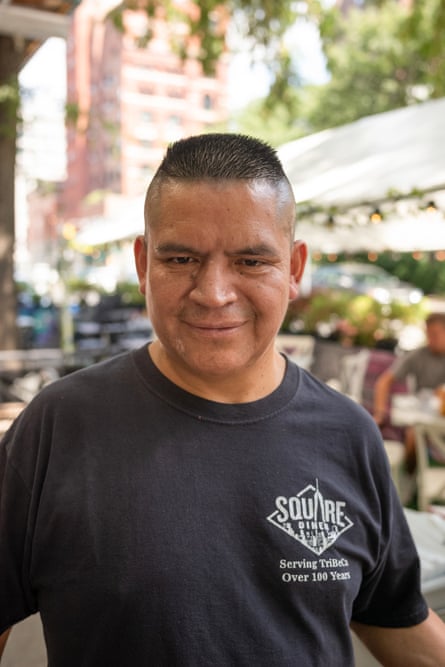Liset Fernandez spent most of the summer worried about her dad, Luis, but a few weeks ago she got some good news. After being held in Immigration and Customs Enforcement (Ice) custody for weeks, an immigration judge in Texas granted him release on a $5,000 bond.
Luis, came to the US from Ecuador in 1994, had been held in detention at a facility in Livingston, Texas, thousands of miles away from his home in Queens. Liset, 17, had taken on extra shifts working a retail job to support her mom and nine-year-old brother. Luis’s co-workers at the Square diner, a railcar-style greasy spoon in Manhattan’s Tribeca neighborhood for over 100 years, had raised more than $20,000 to support him and his family.
But when Liset logged on to a Department of Homeland Security (DHS) website to pay the bond, she got a message telling her that her dad was ineligible for release. It fell to her to tell her dad that instead of coming home that day, he would remain detained. “It was upsetting for everyone,” Liset said. “His voice sounded completely disappointed.”
Luis was being detained because of a new DHS policy arguing that all people who enter the US illegally are ineligible for bond, regardless of how long they have been here and whether or not they pose a flight risk. In Fernandez’s case, DHS went even further, deploying a rarely used maneuver to pause the immigration judge’s bond ruling while it appealed his ruling. Federal regulations allow the agency to automatically stay an immigration judge’s bond decision while they appeal the case to the board of immigration appeals.
The maneuver means Fernandez will remain detained while his case is pending before the board of immigration appeals. Since the board is being bogged down with appeals, it’s unclear how long it could take to resolve the case, said Craig Relles, an immigration attorney representing Fernandez.

Fernandez’s case shows how the Trump administration is “ratcheting up every aspect of the immigration system” for people who have been in the US no matter how long they’ve been in the US, said Suchita Mathur, a lawyer at the American Immigration Council.
“At every step of the way, they’re inflicting the maximum punishment on people,” she said. “It’s all part and parcel of the administration’s effort to make this process so punitive and unbearable that people give up.”
The justice department, which oversees immigration courts, adopted the procedure for automatically pausing an immigration judge’s bond ruling in the aftermath of the September 11 attacks amid concerns about national security. At the time, there were concerns about how it could be used to unjustly detain people. Both Mathur and Relles said they had rarely seen the appeal and stay practice used until this summer. Now, they said the practice is widespread.
Lawyers representing the Department of Homeland Security have been instructed to appeal every decision in which someone is granted bond and immediately pause the judge’s ruling while the appeal is pending, according to an agency official familiar with the matter. They have also been told they will be fired if they do not take such action, the person said.
Asked whether lawyers were being told to automatically appeal in all cases where bond was granted, the Department of Homeland Security said: “Every decision to appeal is based on the facts of the case. No one has been fired for not appealing a case.”
In recent months, federal judges across the country, including in Minnesota, Nebraska and Maryland, have ruled in favor of detained migrants who have challenged the practice. Appealing the bond ruling and automatically staying an immigration judge’s decision to grant bond, the judges have said, puts the due process rights of detainees at risk.
“The government’s discretion in matters of immigration is deep and wide, but surely its chop does not overcome the banks of due process enshrined in the constitution,” Julie Rubin, a US district judge in Maryland, wrote this month in a ruling granting release of a migrant who was detained even though an immigration judge had ordered bond. “Invocation of the automatic stay renders the [immigration judge’s] custody redetermination order an ‘empty gesture’ absent demonstration of a compelling interest or special circumstance left unanswered by [the immigration judge].”
“It seems like there’s a nationwide policy from headquarters instructing them to file these automatic stays,” Mathur said. Such a policy “would raise even more questions about due process. Because if they’re not even conducting individualized analyses before filing these, that’s even more shocking.”
The Department of Homeland Security said Fernandez had entered the country illegally and had two prior convictions for driving while intoxicated. The agency did not provide more information on the cases, but told Tribeca Citizen, a local news site, the charges were from 2003 and 2014.
“Under President Trump and Secretary Noem, if you break the law, you will face the consequences. Criminal illegal aliens are not welcome in the US,” the Department of Homeland Security said in a statement.
But that is not what Fernandez’s co-workers knew. At the Square Diner, he was known as a hard worker, who would work overtime to support his Liset and his nine-year-old son. He was the person who would welcome new employees into the fold, always be quick with a joke, and cover for someone who needed to step out for an emergency and then give them the earnings they missed. He would FaceTime his kids during long shifts and never say a bad word about customers who were stingy with tips. The only thing he would ever eat at work – sometimes with some teasing – were big salad bowls filled with soup. Usually chicken, but occasionally different types mixed together.
The fact that Luis had been in the United States for so long, was working and paying taxes, and had two children who are US citizens made him someone who was clearly eligible for bond, Relles said.
“The Department of Homeland Security had the opportunity to present any and all evidence indicating that he was a danger, that there were serious infractions in the past. And he was able to meet his burden, establishing that he was not a danger and is not a flight risk,” Relles said.
“He’s human. He has heart,” said one co-worker who asked to remain anonymous because they feared for their safety. “He’s [an] extremely honest person. With money, with food, with anything, you just name it. And the most important thing is the best father.” The co-worker said they had spoken to Luis recently and he was working in the kitchen of the detention center where he is being held. Recently he volunteered to give the other detainees haircuts.
The last time Liset saw her dad in person was early in the morning on 24 June when he came to her bedroom to say goodbye. He had been summoned to appear that morning for a check-in on his asylum application in Long Island. The day before he was set to leave, Luis became suspicious that something might happen to him. He shared the location on his phone with Liset. Still, Liset didn’t think there was much to worry about and said goodbye.
It was a scorching hot day in New York and Liset went to the beach with her cousin to celebrate the end of the school year and the start of summer vacation. While she was there, Luis called her. She could tell from the tone of his voice that something was wrong. He told her not to worry, but that he was going to be arrested. “They’re going to take me, Ice is here, and I’m not coming home anytime soon,” he told her. “If anything happens, make sure you take care of yourself.”
Fernandezwas one of thousands of immigrants arrested by the Trump administration as part of its effort to ramp up deportations. Half of the migrants arrested in the New York City area this year have been arrested, like Fernandez was, at routine check-ins at immigration offices, according to federal data analyzed by the New York Times.
Liset didn’t hear from her dad for a few days. But when she eventually got ahold of him he had been transferred to a facility in Texas. Since he’s been detained, Liset has talked to her dad almost every day, usually for just a few minutes. He’s told her that there are about 20 people in his room and that it’s extremely cold because air conditioners are running 24/7. The first few weeks in detention, Liset said, Luis would share a cup of ramen noodles with two other men for meals.
Liset described her dad as a hard worker who wanted to make sure his family was taken care of financially while also making sure he could spend time with them. Since her mom only speaks limited English, it’s fallen on Liset to take the lead on her dad’s legal case while also taking on more shifts at work.
“This is incredibly draining,” she said.
José Olivares contributed reporting

 German (DE)
German (DE)  English (US)
English (US)  Spanish (ES)
Spanish (ES)  French (FR)
French (FR)  Hindi (IN)
Hindi (IN)  Italian (IT)
Italian (IT)  Russian (RU)
Russian (RU)  7 hours ago
7 hours ago
























Comments